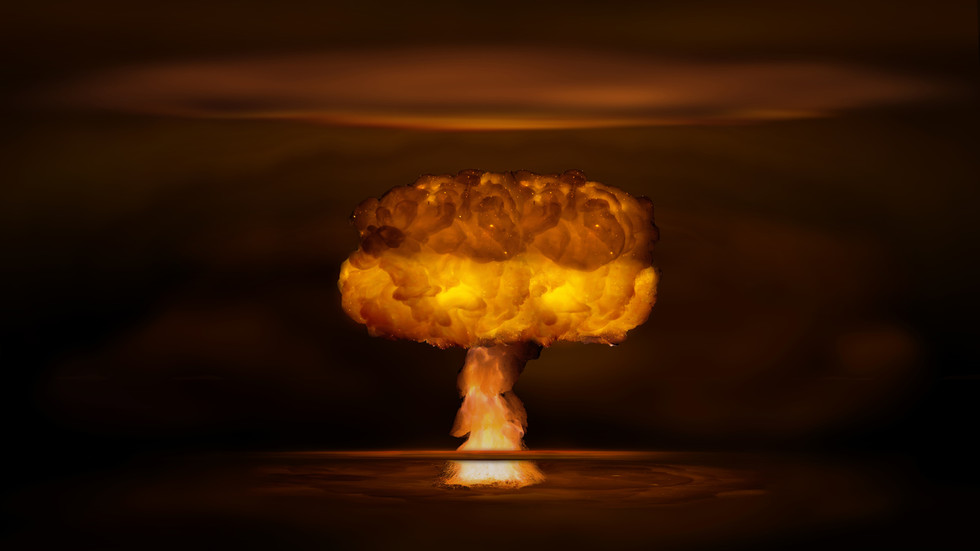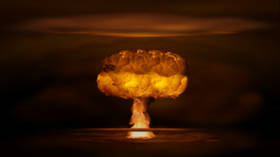
Scared of being abandoned by the US under Trump, European officials are floating the idea of the bloc’s own nuclear force

By Tarik Cyril Amar, a historian from Germany working at Koç University, Istanbul, on Russia, Ukraine, and Eastern Europe, the history of World War II, the cultural Cold War, and the politics of memory
By Tarik Cyril Amar, a historian from Germany working at Koç University, Istanbul, on Russia, Ukraine, and Eastern Europe, the history of World War II, the cultural Cold War, and the politics of memory
@tarikcyrilamartarikcyrilamar.substack.comtarikcyrilamar.com

© Getty Images/dzika_mrowka
With its farmers rebelling, its economy declining, and its traditional parties decaying, you’d think the European Union has enough to worry about at home. Yet its thoroughly detached elites love to think big. And what’s bigger than nuclear weapons? That’s how they have ended up falling for one of Donald Trump’s typically blunt provocations. The former – and likely future – American president has warned that NATO members not spending enough on defense won’t be able to count on US protection on his watch.
Eminently sensible – why do declining but still comparatively wealthy EU states keep behaving like defense beggars? – Trump’s threat has triggered various predictable meltdowns. The White House archly tut-tutted about the “appalling and unhinged” rhetoric of a man who is not, unlike the current president Joe Biden, overseeing a genocide together with Israel. Go figure, as they say in the US. On the other hand, many Republicans have displayed demonstrative insouciance, if not outright agreement. And that is certain to reflect what many ordinary Americans think as well; that is, if they think about Europe at all.
And as if the Big Scary Orange Man hadn’t done enough damage yet, next came the Pentagon, which (sort of) revealed that Russia – that famous gas station sending out its shovel-wielding soldiers to capture German washing machines – is building, if not a Death Star, then at least something equally sinister out there in space: Sputnik déjà vu all over again, as America’s greatest philosopher might have said. All of that, of course, against a background of incessant NATO scaremongering, which, it seems, has succeeded in spooking NATO most of all.
No wonder then that inside EU-Europe, reactions to Trump’s taunting sally have been marked by serious abandonment anxiety. One of its symptoms has been a call for the bloc – or Europe’s NATO members; the issue is fuzzy – to acquire its own nuclear force. One way or the other, Christian Lindner, Germany’s minister of finance, made time from razing the state budget in an economy that his cabinet colleague, the children’s book author and minister of the economy, Robert Habeck, has just labeled “dramatically bad,” in order to pen an article calling for France (not subordinating its nukes to NATO) and Britain (not even in the EU anymore) – two small nuclear powers – to step in as the new security sugar daddies by expanding their nuclear umbrellas over everyone else.

Read more
Katarina Barley, eternally fresh-eyed vice president of the European Parliament and the top EU election candidate of the German Social-Democrats – a party leading a deeply unpopular government while approaching extinction in the polls – and Manfred Weber, head of the conservative faction in the European Parliament, have kept things more general: They simply suggest that the EU should get its own doomsday weapons, somehow. Donald Tusk, freshly re-established as Poland’s EU-subservient viceroy, has made similar noises. Well, who cares about details, right? That attitude of “on s’engage et puis on voit” has, after all, proven a smashing success in Ukraine.
In reality, this is not a problem caused by Trump: That, in a world of more than one nuclear power, the US nuclear umbrella over any place other than the US itself is – and can only be – fundamentally unreliable is, of course, a perennial, structural problem. Those who prefer realism to wishful thinking have always understood this.
Henry Kissinger, for instance, a sinister yet sometimes brutally frank practitioner of realpolitik, explained as much as early as the 1950s – perhaps most succinctly in a television interview in 1958 – just a little over a decade after the dawn of the nuclear age. If any clients abroad were to be attacked so severely or successfully that only a US nuclear strike would be left to respond, any American president – whatever treaties are in place or promises have been made – would always face an impossible choice: Drop the client or suffer a retaliatory strike on America itself. It is true that various policies have been devised to mitigate this dilemma (“limited” nuclear war, nuclear sharing, or the NATO medium-range missiles of the 1980s), but, in reality, it cannot be resolved.
Yet here we are. An EU that seems to suffer from historical amnesia produces chatter about a search for nukes of its own. Not the nukes that are already in US-aligned Europe anyhow, in the national arsenals of France, Britain, and at American bases in five NATO countries, so that, at least, we are already used to them, but different nukes, new nukes. Nukes the acquisition, politics, and rules of which are all still to be figured out. What could go wrong? Everything, really. But let’s be a little more detailed.
First of all, the elites of EU-Europe have, expectably, immediately displayed disunity and confusion. In essence, while no one meant the call for nuclear weapons as a challenge to the US, it was still too much for hard-core Atlanticist compradors: Germany’s minister of defense, Boris Pistorius, NATO’s figurehead General-Secretary Jens Stoltenberg, and the head of the German parliament’s defense committee – and “jokingly” “Volkssturm”-nostalgic (no kidding) – uber-hawk Marie-Agnes Strack-Zimmermann all scrambled to contain the inadvertently mildly subversive idea that Europe could possibly try to do anything significant on its own. Perish the thought! A house so divided against itself is not a safe place to own nukes.
Secondly, nuclear weapons are, of course, meant for extreme emergencies, means of last resort either to serve deterrence by the threat of we-will-take-you-with-us retaliation when all is lost anyhow (the purpose of Britain’s and France’s arsenals) or, at best, in a situation of imminent, catastrophic defeat. One implication of this fact is that the decision to use them would end up with either one person or a very compact group hunkered down in a bunker. Who would that be in the case of the EU? The head of the commission, for instance? Someone like Ursula von der Leyen, a self-promoting, shortsighted, and reckless power-grabber, free of any electoral legitimacy, who is really serving the US and not Europe? Good luck!

Read more
And how would the EU overcome the fact that any such ultimate decider would also have national allegiances: An Estonian or a Pole perhaps, from states, that is, that have their own risky agendas and, to be frank, national(ist) complexes? Or someone from Spain or Greece perhaps, from, that is, countries that may well largely escape the direct effects of a large-scale fight in central Europe, and therefore would have no sane incentive to have Madrid or Athens incinerated to make a last point about Latvia or, indeed, Germany? Set up a committee (unanimity rules or majority voting on when to push the very last red button?), and all you will get is a multiplication of clashing and divided loyalties.
Thirdly, more generally, can you imagine today’s EU – or anything growing out of it – in possession of weapons of mass destruction? That is, a club of states most of which are now stubbornly complicit (International Court of Justice be damned) in an ongoing genocide in the Middle East (committed by Israel against the Palestinians), many of which have a pathological obsession with crusading against Russia, and none of which can even grasp that the greatest threat to their sovereignty comes from their “allies” in Washington.
And that leads us to the final and most fundamental problem: This whole debate about nukes for Europe is based on bizarrely blinkered premises that betray that EU-Europe is by far not politically mature enough to have such weapons (if any state ever is). Because if it were, then its strategists and politicians would honestly acknowledge and discuss one simple fact: A nuclear force would have to deter every possible vitally dangerous opponent, that is, of course, including the US. Yet these are the same leaders that have simply ignored that the greatest act of war, eco-terrorism, and vital-infrastructure demolition against the EU – the destruction of the Nord Stream pipelines – was launched by Washington, whether hands-on or via proxies.
The EU is a large bloc of countries in an increasingly unstable and lawless world where the ever-wider proliferation of nuclear weapons will be inevitable. Hypothetically, such an entity would be a candidate for owning such weapons. Yet, in reality, the EU lacks three essential qualities to even consider acquiring them: It is far too fractious, it has no serious concept of its own interests as apart from and, indeed, opposed to the US, and it lacks an elite that could remotely be trusted with weapons capable of ending the world. There, it is of course, not alone. But isn’t one US on planet Earth bad enough already?
The statements, views and opinions expressed in this column are solely those of the author and do not necessarily represent those of RT.




